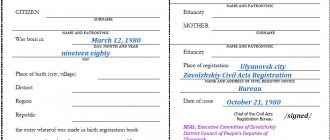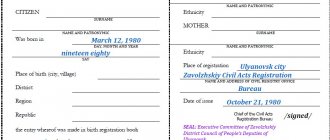Changes to the new law No. 268 that came into force on July 1, 2021
From July 12, 2021, some simplifications in the procedure for children traveling abroad began to apply in accordance with the adopted law No. 268-FZ of July 1, 2021. You can get acquainted with it on the website consultant.ru.
- There is no need to obtain notarized consent for a child to travel abroad with one of the parents. If there is no prohibition from the second parent, the child can go abroad.
- The ban under the new rules may apply to the child’s travel to all foreign countries, or only to a specific state.
- If the second parent issued a ban on the child’s departure, now he can change his decision and revoke it out of court according to simplified rules.
- The ban applies only to minors traveling abroad; it is not valid for trips within Russia.
- Notarized consent of the parent is required only if a minor child under 18 years of age travels abroad independently without parents. The exit consent may indicate the specific country and time of travel. Previously, this required the consent of both parents: mother and father.
- An opportunity has been introduced for a parent who is a citizen of Russia, and has issued a ban on the child’s travel, to travel abroad with the child himself. This opportunity applies only to citizens of the Russian Federation.
More information about simplifying the procedure for children traveling abroad is described in this video.
DEPARTURE OF A CHILD UNACCOMPANIED BY AN ADULT
If a minor citizen of the Russian Federation travels abroad without being accompanied by adults at all, then he must have with him, in addition to his passport and notarized consent, also a power of attorney or other document for a representative of the airline operating the flight on which the child is flying.
The possibility of transporting a child unaccompanied by an adult passenger under the supervision of the carrier is provided for in the Federal Aviation Rules “General Rules for Air Transportation of Passengers, Baggage, Cargo and Requirements for Services for Passengers, Shippers, Consignees”, approved by Order of the Ministry of Transport of the Russian Federation dated June 28, 2007 No. 82 (paragraphs 103 -105), but only if such transportation is provided for by the air carrier’s rules. Specific information should be checked on the official website of the airline.
At the same time, when unaccompanied minors travel abroad, the rules of entry, exit and transit through each specific country included in the child’s itinerary should be taken into account.
Regulatory basis for restricting the departure of a minor
Law No. 114 “On the procedure for leaving the Russian Federation and entering the Russian Federation” regulates all issues regarding crossing the state border. As for minors, the requirements are specified in Articles 20 and 21.
- Article 20 states that a minor child has the right to leave Russia only if he is accompanied by a guardian/parent. Or by an official letter from the parents, accompanied by third parties.
- Article 21 regulates the possibility of one of the spouses to impose a ban on the departure of minor children.
Often the restriction imposed by one of the parents is a consequence of disagreements or divorce of the spouses. If it is not possible to reach an agreement peacefully, the issue is resolved through the courts.
Rules for the departure of children from Russia
The rules that allow you to control the movement of minors outside the country are prescribed in paragraph No. 20 of Law of the Russian Federation No. 114 “On the procedure for leaving the Russian Federation and entering the Russian Federation” (you can download it here).
The main provisions of the law on the departure of Russian children are as follows:
- a child can travel abroad only with adults, namely: accompanied by his legal representative, unless another legal representative has issued a ban on his departure;
- with written permission from the parent, officially confirmed by a notary, if the child is accompanied by a third party (for example, a teacher, family friend, coach, relative).
According to Russian law, in order to take children out of the country, you must also present at border control:
- child's birth certificate or a copy thereof, notarized;
- personal passport.
If the child is not included in the parent’s international passport (you can read the article about whether a child needs a separate international passport by following this link), a special child visa is issued for him for the countries in which it is required (You can find out about applying for a Schengen visa for children by clicking on this link).
Requirements
For children to be able to leave Russia in 2021, they will need:
- Foreign passport or child's birth certificate.
- Consent of a parent or representative who is not an accompanying person. Must be certified by a notary. It is not mandatory at the legislative level, but it is often required by border services, especially abroad.
Birth certificate is the main document for traveling abroad
Setting a limit
Only parents, guardians and guardians have the right to restrict the travel of minor children.
To do this, you must submit an application. It is written in free form.
The applicant just needs to enter information about himself and the child. There is no need to state the reason for the ban.
The application must be submitted in person to the regional Directorate for Migration Issues of the Ministry of Internal Affairs of Russia. Have the original documents with you. Confirmation of family ties or adoption, permission for guardianship of the child will be required.
A licensed notary must ensure that the documents are authentic. Documentation from another state must be translated into Russian. If this is a foreign citizen, you need to contact the appropriate embassy or customs service.
The application does not have a time frame as such. The ban will be in force until it is revoked by the applicant, the child reaches the age of majority, or until it is canceled by a court decision.
Example of a court decision lifting a ban on a child traveling abroad
How to write a statement about a ban
The application is written in free form in Russian. You can't make mistakes. The following information is indicated:
- Service name.
- Personal information of the applicant and the child.
- Confirmation of the relationship between the applicant and the child.
- Demand for travel restrictions.
At the end there is a signature and date of completion.
An application for a ban on the departure of a child is possible.
How to check for a ban
The FSB Information Service, which includes border troops, does not provide information about the imposition of such restrictions. You will only learn the unpleasant news at the border, which, of course, is extremely inconvenient and can disrupt your planned trip.
Which country would you rather live in? ⚡ Take the test in 2 minutes
It is possible to obtain information about the existence of a ban from the Main Migration Department of the Ministry of Internal Affairs. You can apply there in person or through the official website. You will have to wait about a month for an answer. It’s easier, of course, to find out everything from your ex-spouse.
In addition, you can find out the necessary information on the FSSP website or through special online services using your passport or last name. When choosing the second method, you need to be careful and use only proven resources.
Find out more about how to check your travel ban.
Ban notice
The Migration Service, as well as the applicant, is not obliged to notify parents about the imposition of a ban on the departure of their minor child. The law does not require this. But you can check with the migration department at your place of residence, the FSB or the customs service.
It is possible to visit or send a request electronically. The processing time for the application is up to 30 days. You must present a passport and documents proving your relationship with the child.
If all requirements are met, the migration service will provide the requested information without any problems.
Reasons for banning children from traveling abroad
The most common reason is incorrectly executed documents. You should double-check each document form and make sure the information entered is accurate before traveling.
If one of the parents does not agree to allow the children to travel
Clause 21 of Law No. 114 Federal Law provides information about the rights of the second parent in relation to their children.
It follows from the law that the second parent has the right to be notified of the whereabouts or movement of a minor son or daughter, if he does not live with them. Thus, it is impossible to take children outside the country if the other parent does not know about it.
The second parent has the right not to give consent to the free travel of their child abroad.
In such a situation, he writes a statement with the appropriate content to the migration department on the basis of Government Decree No. 273 of May 12, 2003. Even if a teenager over the age of 14 has been issued a foreign passport, this does not mean that until the age of 18 he will be able to freely leave Russia if his parent issues a ban.
Reference! In most cases, the first parent learns about the ban on the flight of children already at customs and border control.
The border service is required to monitor citizens for restrictions on movement outside the country, so you should inquire about the intentions and conditions of the ex-spouse regarding the child in advance.
If the minor has already traveled abroad, the applicant may send an appeal of disagreement with this:
- to the consulate or embassy of the relevant country;
- to the relevant department of the Russian Ministry of Internal Affairs, to the Russian Border Service.
The appeal may be justified by the fact that the applicant did not know about his child’s presence in another country before.
The applicant is not obliged to notify the other party of his intentions, and notification from the authorized department of the Ministry of Internal Affairs of Russia by mail is sometimes not delivered in a timely manner.
You can check the existence of a ban by contacting the migration service in writing before your trip. The response to the appeal must be received in writing. You can pick it up in person, thus making sure of the real situation regarding traveling with your child.
The response to the appeal must be received in writing
Challenging
According to Russian law, it is possible to challenge the ban on a child’s departure. The court does not have a basis, which is presented in regulations and allows the removal of restrictions on travel.
When going to court, it is extremely important to have compelling reasons why the ban on the child’s departure needs to be lifted. Therefore, you need to prepare to correctly present the demands in the claim. All decisions are made by the court in such a way that they satisfy the interests and needs of the child.
Find out more information about preparing documents for a child to travel abroad here.
Positive factors for approval of the application in 2021 may be:
- The desire of a minor child to travel abroad.
- Evidence demonstrating the benefits of the planned trip for the child.
- Selecting a travel period indicating the exact time of stay in another country. It is not advisable to go abroad during your studies. This serves as another reason for refusing to lift the ban.
- A trip to another country is due to obtaining education in it, participation in a competition, the need for treatment of a child and other significant reasons.
A positive result will be affected by:
- Testimony from relatives regarding the need for the child to travel abroad.
- The child's sincere desire to go to another state.
- Paid travel packages.
- Documents confirming the serious health condition of the child and the need for treatment abroad.
- Reasons for studying in another state.
- Confirmation of the significance of the competition in which the child will take part.
- A detailed description of the trip down to the destination and route.
Arbitrage practice
As judicial practice shows, it will definitely be possible to lift the ban on a child’s departure if he needs treatment abroad (if such medical care is not available in Russia). In other cases, the court listens to the arguments of both sides.
Each parent has the right to communicate with the child and raise him. A long trip abroad deprives the ex-spouse remaining in Russia of such an opportunity, so the court may take his side. In general, the judge puts the interests of the child first. If you can prove that the trip will be useful for your son or daughter, and the objections of your ex-spouse are dictated by selfish considerations, the chances of winning in court are quite high.
Lifting the restriction on the departure of children through the court
Often the subject of disagreement and disputes between spouses (especially divorced ones) is the prohibition of one of them from leaving their child from their country. Such an issue is resolved through the court if a voluntary agreement cannot be reached. The court's approval of the lifting of the ban is likely to a greater extent when a trip abroad will benefit the child.
Find out more information on how to lift a child’s travel ban on our website.
Litigation of this type is conducted only in the courts at the place of registration of the plaintiff.
Required documents to be submitted with the 2021 application:
- Applicant's passport.
- Children's documents.
- Confirmation of the plaintiff's rights.
- Evidence of the importance of travel for a child and the injustice of the travel ban.
- Divorce certificate, if available.
Any documents or evidence confirming the good intentions of taking the child abroad will be very useful at trial.
If both parents are against
It is possible that in dysfunctional families it is the parents who can hinder the improvement of their own child’s living conditions.
In this situation, we may be talking about depriving the parental rights of one of them or both. The presence of a court decision to deprive parents or one of them of parental rights is the basis for the complete annulment of the ban, since these people or one of them are already limited in their rights to the child.
In addition, children can be officially adopted by a foster father, mother or family. Border guards are required to let children through, even if the restriction created before the birth parents were deprived of their rights was not cancelled.
When a child does not have the right to travel outside of Russia
To allow a minor child to leave Russia, documents will be required, without which crossing the border is impossible:
- International passport. The child must have a document if traveling unaccompanied.
- Consent from the other parent.
- Letters from parents (when traveling accompanied by third parties).
Parental consent for a minor child to travel abroad
Letters from parents are not always required by Russian customs, but foreign border services are asked to present them. The parent who has restricted travel may consent to the removal of the child under certain conditions.
Consent for a child to travel outside the country, obtained after a judicial appeal of the ban
If consent is obtained as a result of judicial proceedings, it is presented in person at the exit control point.
It can also be sent to one of the following institutions by mail or given in person:
- to the migration department;
- to the migration department, consulate, if the children have already left abroad.
If the document is sent by post, it is better to use a registered letter.
Requirements for children entering another country
Written consent from the other parent is required when entering some countries. It is required both at customs and for visa processing. The application from the second parent must be translated into the language of the country where the child is sent for permanent residence and notarized.
Almost all developed countries have this requirement: participants in the Schengen agreement, Canada, the USA, Japan and many others.
The consent of the second parent has no time frame. However, he can always revoke a previously made decision. Then the child must return to his homeland, and the issue of his whereabouts must be agreed upon by both parents.
If a minor changes citizenship, this issue is considered individually.
Find out about the rules for sending a child abroad with their grandmother on our website.










